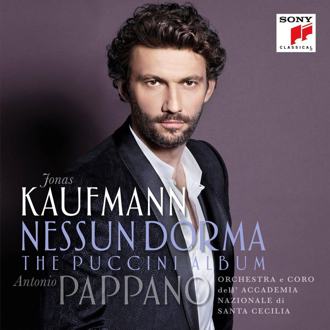
Jonas Kaufmann has been around now long enough for any glaring faults to
have appeared and been criticized; the best we’ve been able to do is accuse
him of crooning occasionally and lacking squillo on top notes. His
preparation always seems to be diligent, his use of dynamics, though
occasionally exaggerated, is both musical and in character, his phrasing is
utterly idiomatic, and the tone handsome and healthy. The problem with a
recital such as this, which includes arias from all of Puccini’s operas
(except, of course, Suor Angelica), is that we realize that tenor heroes are
rarely the most three dimensional folks in any opera, and so a sameness sets
in. But Kaufmann is too intelligent to just slide by, and this, with a few
minor protests, shows him to be unique among today’s tenors.
He is at
his best in Puccini’s more heroic music. As one might guess, his dark-hued
tone is rich and full enough for grand statements. The Edgar and Villi
excerpts, both beautiful arias, are in the exclamatory Verismo tradition of
Giordano and Cilea, and Kaufmann is stunning in both. Luigi’s aria from Il
tabarro is similarly thrilling: it’s a very hard, bitter sing that few
tenors can cope with, but Kaufmann makes us hang on every word and every
note. (He tries his best with Rinuccio’s little aria, singing with great
“face” and impeccable diction, and even keeping the vowels pure on the high
B-flats, but he sounds as if he could beat the hell out of the whole Donati
family, and if I were Schicchi I would keep him away from my daughter at all
costs.)
An exquisite “Non piangere, Liu” is pleading and lovely, with
great use of sweet singing, and “Nessun dorma”, another recording of which
nobody needed, is fine, but it is precisely here that the missing squillo on
the ultimate B-natural is noticeable: the first “vincero”, sung with true
dramatic thrust, is more interesting. “Recondite armonia” makes little
effect, save for the final phrase, which is caressed à la Bergonzi. “Addio,
fiorito asil” is properly emotional, but the abrupt concert ending undercuts
it. Dick Johnson (in both the 2nd- and 3rd-act arias) is a perfect fit for
Kaufmann’s manly tone–probably nobody since Mario del Monaco and Franco
Corelli has sounded so “right” in this part.
“O soave fanciulla”,
assisted by the timid Kristine Opolais, is pretty, and Kaufmann politely
takes the harmonic ending, as written. The little Rondine aria is just as
boring on CD as it is live. Opolais is also his partner in the CD’s first
four tracks, devoted to excerpts from Manon Lescaut. Her voice is beautiful,
her phrasing and feel for the music splendid, but she undersings, refusing
to sing out or lean on a note. Enough about her. Kaufmann takes des Grieux
through his many moods: a wistful but passionate “Donna non vidi mai”; madly
in love, frustrated, weepy, and near hysteria in the second-act duet; angry
and dark in “Ah Manon, mi tradisce”; and gripping in his “No, pazzo son”.
The sound is superb, and Antonio Pappano, orchestra, chorus, and
assisting singers are excellent. If Pappano gives more room to arias like
“Non piangere, Liu”, it helps to make the little aria more effective out of
context. This is an almost perfect recital; when it flops, it’s due to a
mismatch between singer and repertoire. But if you want to sing all of
Puccini’s arias on one CD (except for “Che gelida” and “E lucevan”, which he
recorded for Decca), you do what you can. And what he can is pretty
magnificent.
|